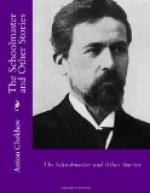Frolov emptied his glass at one gulp and went on.
“But that’s all nonsense,” he said. “One never ought to speak of it. It’s stupid. I am tipsy and I have been chattering, and now you are looking at me with lawyer’s eyes—glad you know some one else’s secret. Well, well! . . . Let us drop this conversation. Let us drink! I say,” he said, addressing a waiter, “is Mustafa here? Fetch him in!”
Shortly afterwards there walked into the room a little Tatar boy, aged about twelve, wearing a dress coat and white gloves.
“Come here!” Frolov said to him. “Explain to us the following fact: there was a time when you Tatars conquered us and took tribute from us, but now you serve us as waiters and sell dressing-gowns. How do you explain such a change?”
Mustafa raised his eyebrows and said in a shrill voice, with a sing-song intonation: “The mutability of destiny!”
Almer looked at his grave face and went off into peals of laughter.
“Well, give him a rouble!” said Frolov. “He is making his fortune out of the mutability of destiny. He is only kept here for the sake of those two words. Drink, Mustafa! You will make a gre-eat rascal! I mean it is awful how many of your sort are toadies hanging about rich men. The number of these peaceful bandits and robbers is beyond all reckoning! Shouldn’t we send for the gypsies now? Eh? Fetch the gypsies along!”
The gypsies, who had been hanging about wearily in the corridors for a long time, burst with whoops into the room, and a wild orgy began.
“Drink!” Frolov shouted to them. “Drink! Seed of Pharaoh! Sing! A-a-ah!”
“In the winter time . . . o-o-ho! . . . the sledge was flying . . .”
The gypsies sang, whistled, danced. In the frenzy which sometimes takes possession of spoilt and very wealthy men, “broad natures,” Frolov began to play the fool. He ordered supper and champagne for the gypsies, broke the shade of the electric light, shied bottles at the pictures and looking-glasses, and did it all apparently without the slightest enjoyment, scowling and shouting irritably, with contempt for the people, with an expression of hatred in his eyes and his manners. He made the engineer sing a solo, made the bass singers drink a mixture of wine, vodka, and oil.
At six o’clock they handed him the bill.
“Nine hundred and twenty-five roubles, forty kopecks,” said Almer, and shrugged his shoulders. “What’s it for? No, wait, we must go into it!”




